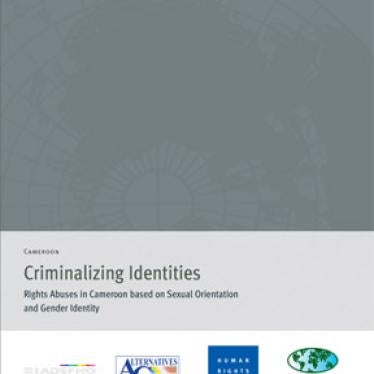A recent decision by the UK Supreme Court found that a gay man would "face a well-founded fear of persecution" if he returned to Cameroon. The Supreme Court overturned the Court of Appeal's decision that this Cameroonian man could return and conceal his identity to avoid persecution.
News outlets quoted Cameroon's communications minister, Issa Tchiroma, as saying, "No homosexual is persecuted in Cameroon." The cases below prove that the UK Supreme Court got it right and that the minister might be unaware of what is happening in his country.
The first time I saw Ewane, in September, 2009, a police officer was slapping handcuffs on his wrists. The handcuffs nearly fell from his bony and undernourished arms, shrunken from his more than five months in prison. Where Cameroonian law saw a criminal, I saw a 27-year old man jailed and ill-treated simply for being himself.
In the brief interview I was able to conduct under the menacing eyes of a police officer, Ewane expressed fear of once again being incarcerated. He went on to describe the severe beatings and abuse by police, prison guards, and fellow prisoners the first time he was detained, in July 2007, on charges of homosexual conduct, a crime in Cameroon. Now he feared a reprise. The penalty for homosexual conduct is from six months to five years in prison and a fine of 20,000 to 200,000 Cameroonian francs (US$ 40-400).
This time the judge did not find enough "evidence" to convict Ewane, but just being accused ostracizes him in a society that condemns relations between people of the same sex.
"Everyone in my neighborhood calls me pédé [faggot]," he told us. "They [the police] can use this, as they have before, to detain me and harass me at any time." He said that he lives in fear that even a casual conversation with another man could lead to another arrest and possible prosecution.
Indeed, Cameroonian police have arrested others under homosexual conduct charges in recent months. On March 29, immigration police detained three men, including an Australian citizen, in the lobby of a hotel in Douala. Two police officers walked into the lobby and approached the Australian and his two Cameroonian friends. An officer told the Australian they knew he was having sex with the men. He threatened all of them with an anal examination to prove their "crime."
One of the Cameroonian men contends that the police officers demanded a US$10,000 bribe from the Australian and arrested the three of them when the Australian refused to pay. Police jailed them for more than three days, until their court appearance. They were released pending their trial.
These men are relatively lucky -- contrary to Minister Tchiroma's statement, most people charged with homosexual conduct in Cameroon are harassed, detained, and jailed for months, as Ewane was.
Conditions in prison are brutal, as Arrey, another gay man, told me in hushed tones in the prison where I interviewed him. "They don't know I am gay," he whispered. Arrested in Buea for stealing a television set, he carried a rosary in his hands as he described what being gay in prison was like. "Suspicion is enough to land you beatings by prison guards and abuse by other prisoners."
Arrey also described what happened to a man caught having sex with another prisoner. The prison guards undressed and beat him in front of the other inmates, then sent him to solitary confinement for 20 days. After the man was freed from solitary, Arrey said, his hands and feet remained shackled for another 20 days. Yet, suspicion is enough
An average solitary confinement cell is two meters by two meters, without light or toilet. The prisoner is forced to urinate and defecate on that floor and to sleep there. Food rations are reduced, and the prisoner cannot see a soul, not even a doctor.
International health and drug control agencies recognize that sex happens in prison, regardless of prohibitions. They recommend condom distribution in prisons to protect prisoners against HIV transmission. But in Cameroon, sex between men is illegal in prison too, and no condoms are provided.
Alim, who was living with HIV and was imprisoned under the anti-homosexuality law in 2005, remained in pre-trial detention for nine months. Another prisoner beat and raped him. He did not receive adequate treatment while in prison and soon after his release, he died from HIV/AIDS-related problems.
But it was not HIV/AIDS alone that killed Alim. The criminalization of homosexual conduct played a large role in his death because of the poor conditions in prison for a gay man living with HIV. Criminalization has also made possible the torture and abuse by police, and others of other lesbian, gay, bisexual, and transgender Cameroonians.
Human Rights Watch and the United Nations constantly remind Cameroon of its obligation to stop these violations and to drop penalties for homosexual conduct. In December 2008, the UN Human Rights Council reiterated this call. So far, Cameroon has refused. This week, the UN Human Rights Committee is trying again to have Cameroon comply with its international obligations.
In the meantime, homosexual relations remain a crime in Cameroon. For people like Ewane, Arrey, and Alim the law means living in constant fear of arrest and abuse. For those lucky enough to leave the country it means not being able to return for fear of even facing death.







